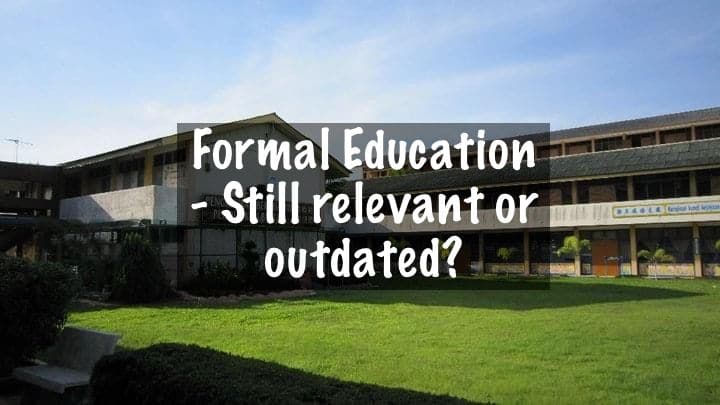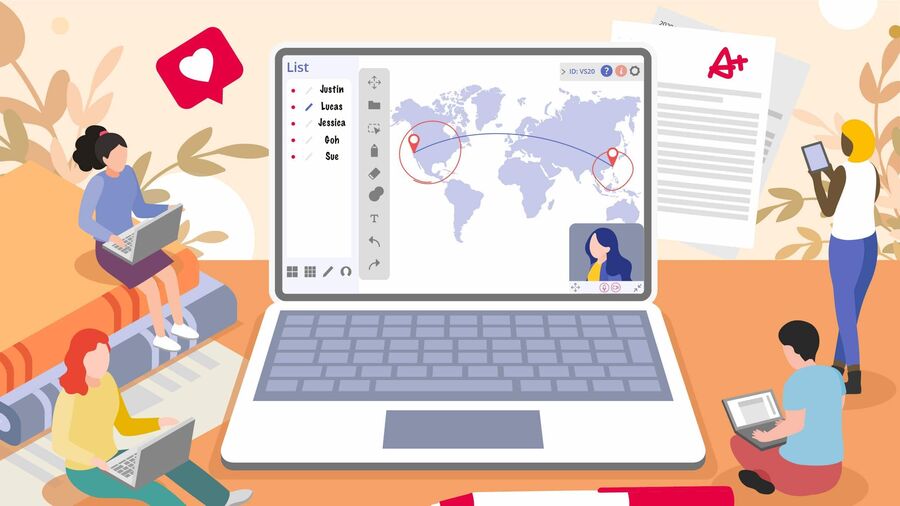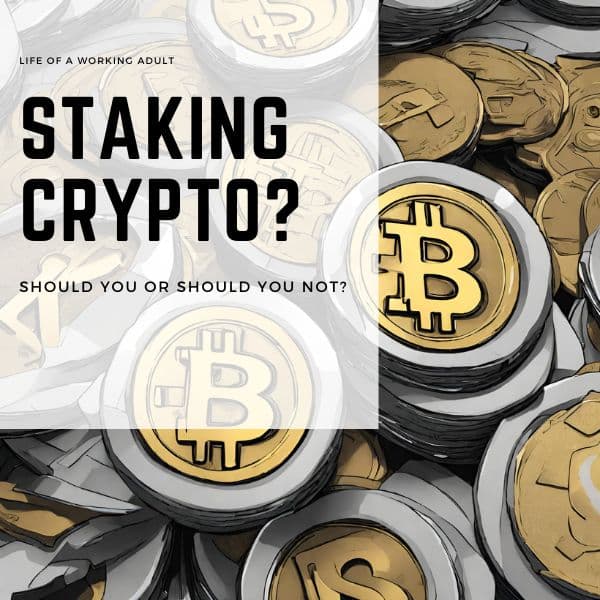Is formal education still relevant today? We are one year plus into the pandemic, and still close to half of the world’s students are still affected by partial or full school closures. Formal education for once, is now taking place outside of school walls. Hence, the big question, is formal education still relevant in the 21st century?

What is formal education?
The term education originates from the Latin word “Educare”, meaning “to nurture”. Formal education is a structured and systematic form of learning, usually within a school, higher education or university. The history of formal education dates back at least as far back as the first written records were recovered from ancient civilisations, and that’s way back in the 2061-2010 BCE in the middle east.
| Did you know? According to Merriam-Webster, education is defined as: 1. The action or process of teaching someone especially in a school, college, or university; 2. The knowledge, skill and understanding that you get from attending a school, college, or university; 3. A field of study that deals with the methods and problems of teaching. Essential meaning of education – Merriam-Webster |
Over the years, education has evolved. The subject matter and skills that were taught by educators evolved with time, but still education remained within the four walls of a school.
“Education is the creation of a sound mind in a sound body.”
Aristotle
Is it time for a disruption to formal learning?
Formal education from my point-of-view
I remember my formal education to be quite dull. My education was an education that focused on teaching, not learning. There’s a misconception that for every ounce of teaching, there’s an equivalent amount of learning taking place by those being taught. I can’t remember most of what was taught in the classroom, and those that I remember is now irrelevant to my work.
Read also: A Different Ending to Secondary School
I used to remember that teachers used to ask us to memorise stuff. I remember memorising Chinese essays because I just couldn’t master Chinese. It was the easy way out. A good grade does not signify that you have mastered the subject. Often, memorisation is mistaken for learning.
Today, with technological advances, the younger population are aware of the fact that most of what they are expected to learn in school can be done faster by computers and machines. A math problem can be solved by a computer way faster than your average child. So, why are children still being taught according to the methods that were passed down by our forefathers? They are now treated as poor surrogates for such machines.
Formal education in the eyes of an educator
Over-emphasis on the wrong things
I sometimes listened to my mom and her friend talk the about the school system. To them there is an over-emphasis on the outward appearance and KPIs. One of the conversations I have been privy to is the class assessment or PBD. Class assessments are supposed to evaluate the students’ progress but with the written exam still being carried out and the marks from it used as the main yardstick, the class assessments are pushed to the background. Class assessment are supposed to be ongoing throughout the year. However, with written exams being the main determinant in deciding a kid’s ability, classroom assessment carries no weight. So those kids who fall behind, continue to fall behind cos when you have automatic promotion and exams used mainly to stream kids, you will still get a lot of kids with poor literacy.
We have our own speeds of learning, yet it’s not accounted for
Logic will dictate that not every kid will be able to achieve the same level of mastery in the same period. Some will be faster, others slower. Yet all of them are pushed up one level when the academic year ends. And the written exam results become the main denominator in deciding who goes to which class. Everyone moves up one level, regardless.
What I infer here is that the current system is in contradiction to itself. An education system should not be this confused if it really wants to make sure that the kids really learn something. So, I guess this is where the Malaysian education system has lost its way. When we keep pushing those who have not mastered the required skills up to the next level, they will continue to fall behind. That’s the system failing such kids.
So, I guess it makes formal education a failure. I mean, what is the point of staying in schools and leaving 11 years later with hardly any skills. These kids might be better off being an apprentice in some skill-based place because in 11 years, they would be almost a master at what they were apprenticing for. Perhaps this is where more vocational schools should come in, but we have way too few of such schools.
What should be the new way of teaching?
Educators should be guiding, and students teaching
I believe that teaching should be done by the students and the educators facilitating and learning. It’s kind of topsy-turvy of what the education system is right now. My best strengths, like my Excel skills (I hope), were self taught. When someone approaches me for a problem in churning out a report on Excel, and if time permits, I usually just provide them with a brief overview of the formulas I think would work, how it works, and I would ask them what they thought about it.
I find that rather than just giving them the solution, I’d give them the tools to do it instead. Often, by using this method, the solution would be much better than the one I originally had in mind. The someone would also remember better and know how to apply that formula / method in the future.
Educators should be the same. They should serve as a guide and provide resource to the students, facilitate their learning, but never be the one who force feeds content into the students’ minds.

Make time for trial and error
This is probably not tolerated at all in a classroom these days. I see my mom teaching English and trying to convince her students that it is in their best interest to write their own essays. She wanted them to try write, if there were errors whether in the use of language or in the way they organised their thoughts, it was okay. She’d try to guide them around the issues.
I was one of her ‘students’ back, more than a decade ago. I remember it was hard those early days when she would throw us topics to write. There’s wasn’t much I could write or my friends who were with me at that time. But over time, I can’t recall over how many trial and errors, my writing became better even though it was not quite up to her expectations. But today, I think I am able to express many of my thoughts down in words, and I think those trial and error sessions had a lot to do with it. One thing about her was she was always ever ready to let us explore our own ideas. I think very often, she forced us to think when all we wanted was just the sample.
It was the same with learning to identify the main ideas of things I read or are told to me. She made me do my own notes. One of the things she convinced me to do was to use SmartDraw to create mind maps. I remember working on my Science notes when I was in Form 2/3. When you make your own mind maps, one thing that is sure is you will redo your mind map again and again. And when you have a digital tool like SmartDraw, the trial and error was a sure thing.
That skill went with me to university and after my final year, my notes had a price tag to it because it was clear and effective. Trial and error makes us better because the learning that takes place is consolidated internally. Anything internalised is more likely to remain with us, rather than being force-fed onto us.
I think kids today live very rushed lives, rushing from school to the many tuitions that deprive them of the opportunity to go through this process of trial and error. Everything becomes so rushed that their little free time is put aside for their social media or gaming. When you can’t try, you won’t make mistakes. When you don’t make mistakes, I think we also lose out the ability to handle many of the challenges that life throws at us sometimes.
So if formal education deprives kids of this opportunity, then I think it loses much of its relevance. The objective of education is learning, not teaching.
Perhaps mass education is no longer the way to go
What is mass education? It’s the education that is standardised for all. The curriculum, determined by those who had a grand plan of producing students able to read, write, and have the skills to contribute to the economy. They determine which skills and knowledge are necessary for the people to be productive citizens for the country.
What we learn in school is standardised, to fit into the standardisation that was needed by the Industrial Age and culture, standardised material that will do as required, in a world that was rather regimented. We wanted workers who could just think enough, and not people who could think beyond those parameters.
However, that system was not in place before that. Prior to that, people would flock to the greatest of men to learn what they had to say or their craft. The greatest scholars, Socrates, Aristotle, who had original insights – people would flock to them to hear what they had to say. Those who stayed put (the “students”), were those who felt that their perspective were relevant enough to their own personal quests and stayed back to learn.
Even now, it is still true today. If one would like to learn drawing, one does not go to an artist to learn drawing, they go to see the artist talk about his approach and see how he does it. The student would then interpret it to his own technique and approach. Likewise, schools should enable people to go where they want to go, not where others want them to go. Unfortunately, this only happens when a student graduates from secondary school and heads into university. Even so, there is a standardised curriculum for all.
Closing words
Perhaps what’s wrong with the current education system is stems from the definition of the “education” term itself. It is now standardised education for the masses. We have been dictated to learn skills and knowledge that is deemed necessary to be a productive citizen for the country. What is to be learnt has been defined and standardised by our people who lived generations ago for the industrial culture, a curriculum not quite relevant today. Yet now as we stand in the 21st century, few have risen to challenge it.




